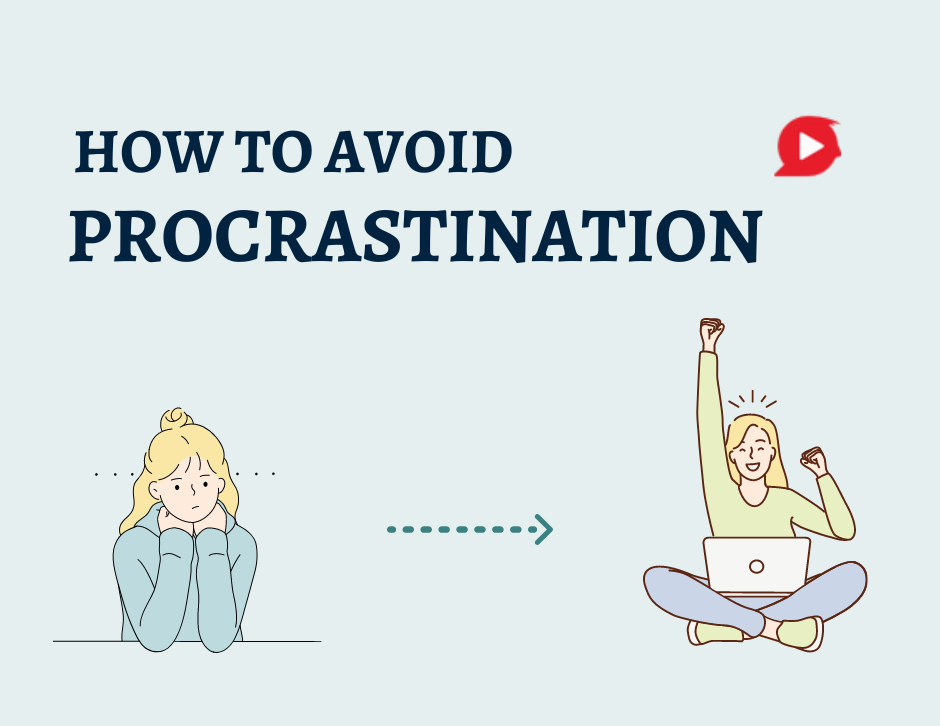How to avoid procrastination

It's Monday today, you have a 500-lines long code to submit on Friday. It is very important for you.
It's 9 pm already and you know you should start working in advance but you have no motivation, and you just don't feel like it so you don't. You choose to procrastinate.
And just like that, Tuesday and Wednesday passed. You were busy streaming Netflix, watching YouTube, scrolling Instagram, etc. You have done no progress.
And on Thursday you realize that it's Friday tomorrow. You have written no line of code and now you will have to pull an all-nighter if you don't want to miss the deadline!
You wouldn't have had to deal with stress, lack of sleep, and anxiety all on the same night if you had spread out your work over the 4 days, didn't put it off, and planned accordingly.
Hence, read this blog on how to avoid procrastination, so that you don't have to deal with the insane amount of workload last night before the deadline.
Table of Contents
- Eat the frog technique
- Track your progress - use the best tools available
- Split the task into chunks
- Get to the roots - figure out the "WHY"
- No clear direction - plan in advance
- The 5-minute rule
- Build better habits
- Set a reward mechanism
1. Eat the frog - finish the most important task first.
The phrase "eating the frog" refers to finishing the biggest and most important task first thing in the morning. You can then proceed to eat the smaller frogs or, to put it another way, to do the lower priority or less important tasks after that.
This method may be most useful if you have a never-ending to-do list. Setting the priorities for all of your tasks the night before and starting them the following morning in that high-to-low priority order is the most effective method.
The hour after lunch, is far less productive than the first hour of the morning, when your energy and willpower are at their highest.
With a fresh mind, you can accomplish twice as much work in the morning as you can at any other time of the day. Eat the Frog makes sure that you use your most mentally demanding work during your best hours and saves less crucial tasks for when you've used up all of your day's mental energy.
2. Track your progress - use the best tools available
Not only Pomodoro apps or apps that remind you to get to work but also other progress tracking apps like Developer Diary could be helpful.
Some tools that you could use are:
- Toggl
- Focus at will
- Habitica
- Todoist
- Trello
Developer Diary by Invide is a minimalist, free, journaling and progress tracking app, so when you check your progress and see how far you have come, it in turn motivates you to keep going and continue working hard.

3. Get to the roots - figure out the "WHY"
Understanding why we procrastinate is the only way we can break through and begin to get things done.
Think about the influences, habits, and thoughts that contribute to your procrastination.
For instance, are you putting off a task because you find it boring or because it takes so long that you know you won't be able to finish it today and are now trying to avoid it altogether?
Another reason might be that your to-do list has overtaken you, making it difficult for you to decide which task to tackle first.
Each of these issues would have a unique solution.
Suppose if you find a task boring, you could use the Pomodoro technique or set a reward mechanism(you reward yourself after you have done it successfully).
If you are trying to escape it because you think that you won't be able to finish it, you can split the task into, smaller tasks and also prioritize them.
4. No clear direction - plan in advance
You should schedule your day in advance. You can do it on paper and a pen or with one of the many available apps.
Setting well-defined goals and deadlines are critical. When scheduling a task, be sure to include the precise "when," "where," and "what" of the activity so that the result is clear.
For instance, "I will spend 30 minutes at 6 a.m. on my work desk reading the Next.js documentation."
The more detailed plan, the better.
5. Split the task into chunks
An extensive reason why we tend to procrastinate is that we fear that the task is way too big and it is impossible to get it done in a short time or we won't be able to finish it. So we try to escape, and we procrastinate.
A solution to this is splitting your to-do list into smaller to-dos or following the Pomodoro technique. In the Pomodoro technique, we work for 25 minutes and then take a break of 5 minutes. After 2-3 such sessions, we can take a longer break of 10-15 minutes.
This helps us remain focused and also lowers the odds of procrastinating.
6. The 5-minute rule
The 5-minute rule is very simple.
When you have realized and accepted that you are putting off something, you have to put an immediate halt to anything that you are doing and take a deep breath.
For example, if you are scrolling on your phone, keep it away and take a deep breath.
Consider that you will only be working for five minutes, then get to work. Because five minutes is just enough time to divert your attention from the current task and to persuade your brain to begin working.
You will undoubtedly end up doing it for much longer than just 5 minutes if you persevere through the first 5 minutes as it will help you get into the initial flow.
I use this trick a lot when I procrastinate.
7. Build better habits
Habits maketh man.
Habits play a very crucial role in how we live, work, eat, and most of our routine activities. But habits also include getting up early, sitting down to work even when uninspired, studying without fail every day, etc.
Motivation can come and go in our life but habits are permanent.
Even when we don't feel like it, we work because of our habits. Habits encourage us to work when we want to procrastinate.
Building habits is a lot simpler than you think, all you have to do is show up every day because that is what habits are. It can be something as simple as sitting down to code at the same time, at the same place every day.
8. Set a reward mechanism
Rewards motivate us to keep working hard similar to how you were rewarded when you were a kid. Rewards can be something as basic as your favorite food or 30 minutes of your favorite anime.
Rewards in turn create good habits of not procrastinating because your brain understands that you will be rewarded if you finish the task right away rather than putting it off.
For more
- Join Invide's remote developers' community on a new discord server where I post developer productivity tips and tools frequently.
- You can read my other blogs here.
- Latest blog on 9 Project Management Softwares for Remote Engineering Teams.





Member discussion